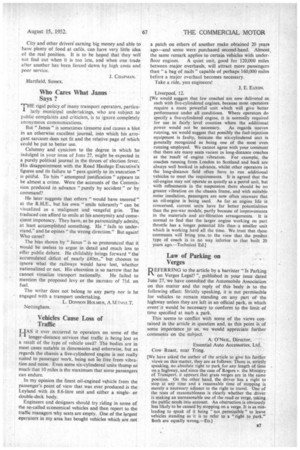Vehicles Cause .Loss of Traffic
Page 41

If you've noticed an error in this article please click here to report it so we can fix it.
HAS it ever occurred to operators on some of the longer-distance services that traffic is being Jost as a result of the type of vehicle used? The bodies are in most cases suitable in dimensions and otherwise, but as regards the chassis a five-cylindered engine is not really suited to passenger work, being not'Ao free from vibration and noise. Even some six-cylindered units thump so much that 10 miles is the maximum that some passengers can endure.
In my opinion the finest oil-engined vehicle from the passenger's point of view that was ever produced is the Leyland with its 8.6-litre unit and either a singleor double-deck body.
Engineers and designers should try riding in some of the so-called economical vehicles and then report to the traffic managers why seats are empty. One of the largest operators in my area has bought vehicles which are not Liverpool, 12.
[We would suggest that few coaches' are now delivered as such with five-cylindered engines, because most operators require a more powerful unit which will give better performance under all conditions. Where operators do specify a five-cylindered engine, it is normally required for use in fairly level counties where the additional power would not be necessary. As regards uneven running, we would suggest that possibly the fuel-injection equipment is faulty, because the six-cylindered unit is generally recognized as being one of the most even running employed. We cannot agree with your comment that there are many seats vacant in long-distance coaches as the result of engine vibration. For example, the coaches running from London to Scotland and back are always well booked in advance, whilst other operators in the long-distance field often have to run additional vehicles to meet the requirements. It is agreed that the oil-engine may not operate as quietly as a petrol unit, but with refinements in the suspension there should be no greater vibration on the chassis frame, and with suitable noise insulation, passengers are now often unaware that an oil-engine is being used. As far as engine life is concerned, current units have far better potentialities than the pre-war models, partly because of improvements in the materials and air-filtration arrangements. It is normal to find that the larger engine working on part throttle has a longer potential life than a smaller unit which is working hard all the time. We trust that these comments will bring you. to the view that the preient type of coach is in no way inferior to that built 20 years ago.—Technical Ed.]




















































































